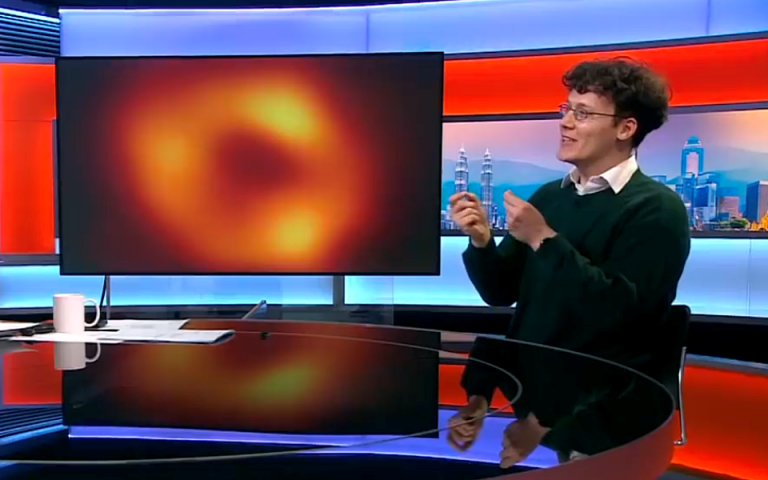Dr Ziri Younsi
Dr Ziri Younsi is a UKRI Stephen Hawking Fellow at UCL's Mullard Space Science Laboratory (MSSL).

1 June 2022
When did you take up this position? What was your position beforehand?
I joined (well, re-joined) UCL in 2018 as a Leverhulme Trust Early Career Fellow, before which I worked at the Goethe University of Frankfurt as an Alexander von Humboldt Fellow. I was a PhD student at MSSL before I left the UK in 2014.
Tell us about your work at UCL. What do you specialise in?
I am an astrophysicist, my main research focus being on interpreting observations from systems containing compact objects like black holes and neutron stars. These systems are unique laboratories for testing many of our physical theories in regimes inaccessible to experiments here on Earth.
I combine theory and numerical simulations of plasmas and radiative emissions from compact object environments to interpret data obtained from missions like the Event Horizon Telescope (EHT), so that we can learn more about the nature of these mysterious objects.
I'm especially interested in how systems comprising black holes and neutron stars can be used to probe fundamental physics and yield novel tests of general relativity (Einstein's theory of gravity).
What are some of your favourite things about working in the department? How have you found it different to previous jobs?
MSSL is a unique department, set in the Surrey hills with beautiful views of the countryside. I enjoy the fact that we have beautiful grounds, and even our own croquet lawn and swimming pool! It has a relaxed and open atmosphere and is a lovely place to work.
I appreciate the unique character and layout of the building, and the resulting opportunities to interact with people in different research groups. I'm also very fortunate to both work with and learn from an excellent community of scientific colleagues.
I’ve had the privilege to work with colleagues across several different teams and departments within the wider UCL community, as well. It’s been a genuine pleasure to get to know so many interesting and talented colleagues. UCL is an impressively diverse place to work, and I very much enjoy the warm atmosphere and inclusive community we have.
Can you tell us about any recent research, or future projects that you are looking forward to working on?
I co-lead the Fundamental Physics working group of the next-generation EHT (ngEHT), a more advanced instrument with greater sensitivity and resolving power than the current EHT. I'm very excited about our ongoing and future work in the EHT and ngEHT projects. The field of horizon-scale imaging of black holes is just beginning and I’m delighted that there has been so much interest in our results, from both the scientific community and the public.
These first images are pioneering measurements and I feel that in the next few years this field will reach a new stage, providing detailed, quantitative studies of black holes, their immediate environments, and the theory of general relativity.
I'm also a member of the Laser Interferometer Space Antenna (LISA) mission as part of the UCL team. I'm keen on exploring what future LISA observations of coalescing compact objects can reveal about the physical properties of black holes, neutron stars, and the structure of spacetime. Whilst missions like LISA won't be launched until at least the mid-2030s, there is an enormous amount of exciting work to be explored.
Have you always been based in London? If not, when did you move here, and how did you find adapting to living in London?
I was born in Stoke-on-Trent but grew up in London, so I suppose that makes me a Londoner! Whilst the pace can sometimes be hectic, I appreciate the vibrant, multicultural character of the city.
Finally, tell us about your non-work life. Do you have any hobbies, or favourite places to go in London?
As a child I always enjoyed playing sports. Throughout my childhood and teenage years, I studied Taekwondo and was a competitive club swimmer. I also played the violin.
These days I enjoy cycling, swimming and resistance training, and I also love long walks (when the weather is nice!). I like travelling, visiting friends and family (many of whom live abroad these days), and exploring new places.
I appreciate the many theatres and shows in London, and the breadth of international cuisine available.
Image
- Screenshot of Dr Ziri Younsi on BBC
Video
- “The first image of the black hole at the centre of our galaxy.” Credit: UCL / FILMBRIGHT
 Close
Close

